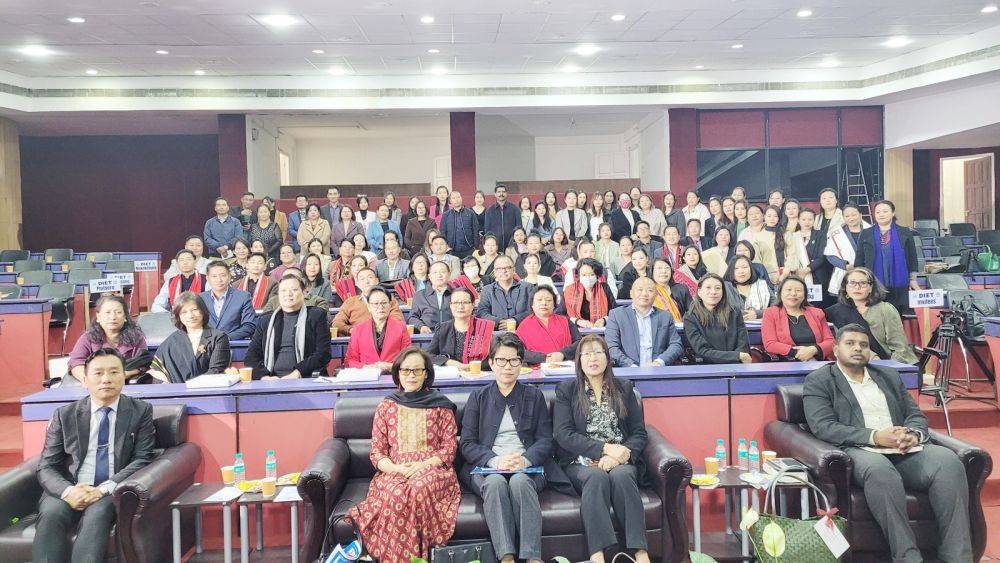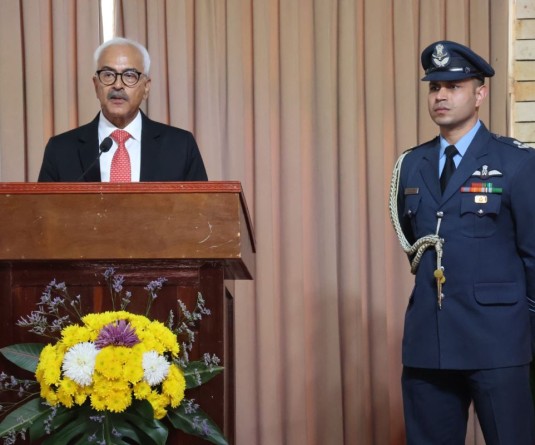Dignitaries and others during 1st general conference of ANDIETFA in Kohima on November 25. (Morung Photo)

ANDIETFA holds 1st general conference in Kohima
Our Correspondent
Kohima | November 25
The All Nagaland District Institute of Education & Training Faculty Association (ANDIETFA) today held its 1st general conference under the theme ‘Inspiring Change’ at Capital Convention Centre, Kohima.
The conference was marked by release of action research of 8 District Institutes of Education & Training (DIET) under State Council of Educational Research and Training (SCERT) in Nagaland, screening of DIET activities, Teaching Learning Materials (TLM) and Life Skills products exhibition and discussion hour.
Speaking on the occasion as the guest of honour, Temsunaro Aier, IAS, State Mission Director, Samagra Shiksha, Nagaland appreciated ANDIETFA for organizing its first General Conference with the theme ‘Inspiring Change.’
“This theme is absolutely relevant in our context because we need to inspire positive change at all levels to transform the quality of education in our state,” she said.
Stating that DIETs were established in India with the implementation of National Education Policy 1986 with its core mission to provide academic and resource support at the grass-roots level to achieve Universalisation of Primary/Elementary Education (UEE) and Adult Education in the country, she said “Thus, DIETs have been visualized as an academic and intellectual body at the district level to offer all the support required to improve the standard of primary education.”
Under erstwhile District Primary Education Programme (DPEP) and SSA it was envisioned to achieve Universalisation of Primary Education and Enrolment in the country however, the quality of primary & elementary education could not improve as desired, she said.
In 2018-19, Government of India introduced Samagra Shiksha, an integrated scheme for school education by covering the entire gamut from pre-school to class- 12. The scheme treats school education as a continuum and is in accordance with Sustainable Development Goal for Education (SDG-4). It ensures that all children have access to quality education in an equitable and inclusive classroom environment which takes care of their diverse background, multi-lingual needs, different academic abilities and make them active participant in learning process.
Among others, some of the core objectives of Samagra Shiksha is implementation of NEP 2020 recommendations, RTE 2009 Provisions, ECCE, Foundational Literacy & Numeracy, thrust on holistic, integrated, inclusive and activity-based curriculum and pedagogy, bridging social and gender gaps in school education and ensuring inclusion at all levels of school education, Aier said.
DIETs critical to play enabling roles in improving overall quality education
In the light of National Education Policy 2020 being implemented in the country, she said that the role of DIETs have become extremely critical to play enabling roles in improving overall quality education particularly at the Foundational Stage. This can be done by providing quality pre-service and in-service teacher training, developing teaching resources and sharing it with schools, providing mentorship to EBRCs & Schools, conducting action researches, dip-stick studies, academic support and capacitating teachers.
She appreciated the contribution made by the DIET faculties from the DIETs and those deputed in SCERT for their active roles in developing academic resource materials for the schools under Samagra Shiksha.
The NIPUN Nagaland theme song composed and developed by Kenilo Semp, Sr Lecturer DIET Chechama is one such commendable job done by a DIET faculty member, she said.
Status of education in Nagaland
Highlighting the status of education in the state, she said “As per UDISE data, we have 1770 (GPS-1032) Government schools having primary section with 9337 primary teachers. Out of this number of teachers, 1675 are still untrained which is a matter of concern for all of us.”
Out of about 1,64,324 students enrolled in Government schools from PP -Class 12, a total of 39,372 are in Pre-primary and 67,368 from Classes 1-5.
“If we put Pre-primary and primary classes, there are 1,06,740 students which comprises of 65% of the total student's enrolment in the Government schools,” she said.
This is a clear indication of how important it is for us to provide Quality Primary Education to ensure better future for our people, she said.
Touching on state report on Foundational Learning Study (FLS) conducted in 2022 to assess the achievement level of children in the foundational stage, she said “Our State overall achievement in FLS was 28% which is the second lowest in the country.”
Looking at NAS, FLS and PGI report of our state, we also must step up from our comfort zone and work hard to bring positive transformation in our education system, she insisted.
On many teaching resources developed by DIETs, she, however, said “I am concerned to learn about the missing linkage between the DIETS with EBRCS and Schools. We need to build strong linkage between these institutions so that it can extend its resource support to the EBRCs and provide mentorship to the schools. We will initiate measures to strengthen the DIETs and provide necessary resources to enable the DIETS to take academic lead roles in the districts.”
‘Teacher education most significant components of SCERT, DIETs’
Also speaking at the conference, Nagaland SCERT Director, N Chumchanbeni Kikon said that DIETS which have been established with a Mission of “Providing academic and resource support at the grass-roots level for the success of the various strategies and programmes being undertaken in the areas of elementary and adult education.”
For almost three decades now, DIETs in Nagaland, beginning with the premier institute DIET Chiechama in 1993, have been preparing teachers, both in-service teachers and prospective teachers to teach in elementary schools. The teacher education programme, currently called D.El.Ed. along with many other programmes and activities conducted by DIETs, which is headed by the Principal and backed up by a team of passionate and dedicated teacher educators, have been positively impacting elementary school teachers, students and the society in the state, she said.
These efforts of DIETs are greatly appreciated by one and all.
Kikon said that teacher education institutions being responsible for preparing teachers, thus, have an enormous role to play in influencing the quality of education and its contribution to the development of the state and the nation.
“Teacher education has always been one of the most significant components of SCERT and DIETs. The National Education Policy (NEP) 2020 puts forward many policy changes concerning teachers and teacher education.
Recognizing the 'power of teacher' NEP 2020 has put in place systemic reforms that would help 'teaching' emerge as an attractive profession of choice for bright and talented young minds. It proposes several reforms to empower teachers and 'restore the high respect and status' to this profession hoping that it would eventually attract the best minds and talent to choose teaching as their profession,” she said.
Slow paradigm shift in system of teacher education in India
With the successful introduction of the National Curriculum Framework (NCF)-2005, National Curriculum Framework for Teacher Education (NCFTE) 2009, and Right to Education Act (RTE), 2009, we have been witnessing a slow paradigm shift in the system of teacher education in India, Kikon said adding “Over time, the focus of the system has been shifting away from disciplinarian, rote memorization, to a collaborative construction of knowledge.”
She said that, following the NCF 2005 and NCFTE, 2009, the teacher education strategy is aimed at instilling the teachers with skills to become facilitators of knowledge rather than gatekeepers of information as well as to make teaching less textbook-oriented and to connect knowledge to life outside the school.
“With all these and now with the implementation of NEP 2020, DIETs have a huge role to play in bringing about success in the educational reforms and in enhancing the quality of teacher education,” she maintained.
To meet the requirements of teacher preparation process, with a complete paradigm shift in the mechanism and processes, DIETs and SCERT along with other stakeholders and academic bodies need to work collaboratively.
“I sincerely hope that this conference will provide an opportunity for everyone to share knowledge, express ideas and develop strategies that will enhance teamwork with strong will and determination to bring transformation in the quality of education in the state and to achieve the aspirations and goals envisioned in the NEP 2020, “ Kikon said.
She was optimistic that ANDIETFA, the apex body for elementary teacher education institutions, will play a pivotal role in ensuring quality education in Nagaland and will remain a source of 'inspiring change' as the motto of the conference aptly puts.
Earlier, the programme was chaired by ANDIETFA president Kenilo Semp while ANDIETFA Information Secretary, Lothunglo Humtsoe delivered welcome address. Vote of thanks was proposed by ANDIETFA General Secretary, Dr Aneile Puro.





